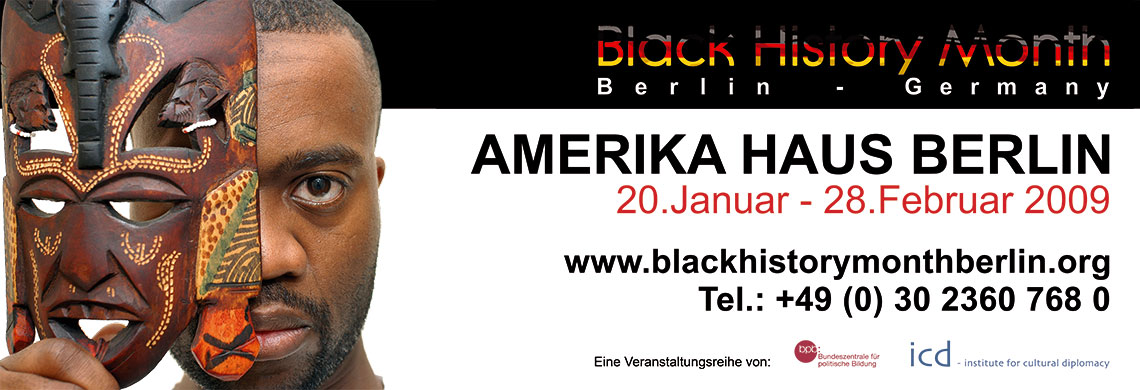Event Review
Once settled into the auditorium, the diverse audience were treated to a lively discussion moderated by Adetoun Adebisi-Küppers, co-founder of the online media portal CyberNomads. The panel comprised Michael Küppers-Adebisi, who co-founded CyberNomads and works as a multi-media artist and culture manager, journalist and film director John Kantara, Director of the Wittenberg Centre for Global Ethics and corporate responsibility expert Tumenta Kennedy, and Professor John Long of The University of Illinois, Chicago, who moderated the discussion at the first event in the Black History Month in Berlin series on 1st February 2009.
After introducing herself and inviting the panellists to share with the audience some background information about themselves, Mrs Adebisi-Küppers asked the panel to give their opinions about black identity in Germany. She asserted that the situation for black people in Germany is very different to that of those in the United Kingdom, France and the United States, where one’s national identity is not called into question because of one’s colour of skin. When asked, ‘what is special about being black in Germany?’, Professor Long replied, ‘nothing!’, adding that any such feelings result from preconceptions that exist in society. Michael Küppers-Adebisi agreed, saying that the necessity to differentiate is what is special about being black in Germany; there is nothing inherently different between any peoples, ‘we are all part of a global culture’. He also commented that, whereas ‘Afro-American’ is an established and accepted identity in America, ‘Afro-German’ remains peripheral in Germany. Tumenta Kennedy shared the feelings of isolation he felt upon first arriving in Germany and reminded the audience that the German constitution protects the value of human rights, not just those of fellow German citizens; a call to a more cosmopolitan way of thinking. John Kantara spoke about how African and German histories have many points of intersection, long before the ‘war babies’ were born, and even before the Berlin Conference of 1884-5. Following further discussion about the tasks facing the African Diaspora in Germany, Kennedy and Mrs Adebisi-Küppers concluded the section of the programme by publicising a joint project that they are co-founding, the ‘African Diaspora Union’, which will address the central forum for the ‘6th region of Africa’: ‘our destiny no longer lies in race issues – it is up to us to ask, ‘what have I done to ensure that I am no longer judged by my skin colour?”.
The discussion was followed by a poetry performance by Emmanuel Eni, entitled ‘Black Man in European Kitchen’. Dynamic and charming, Eni portrayed a character who finds himself with the task of cooking for his hosts and negotiating the unfamiliar surroundings. Accompanied by a drummer, the audience sat captivated during the show. The remainder of the evening was dedicated to music; Reggie Moore and Friends entertained visitors with ‘The Roots of Jazz and Swing’, a tribute to the music of legends such as Scott Joplin, Duke Ellington, Sonny Rollins and Miles Davis. The charismatic and engaging Moore, who was also the first recipient of the ICD Cultural Ambassador award, mixed education with entertainment as he helped to highlight what was special about the musical genres being showcased.










